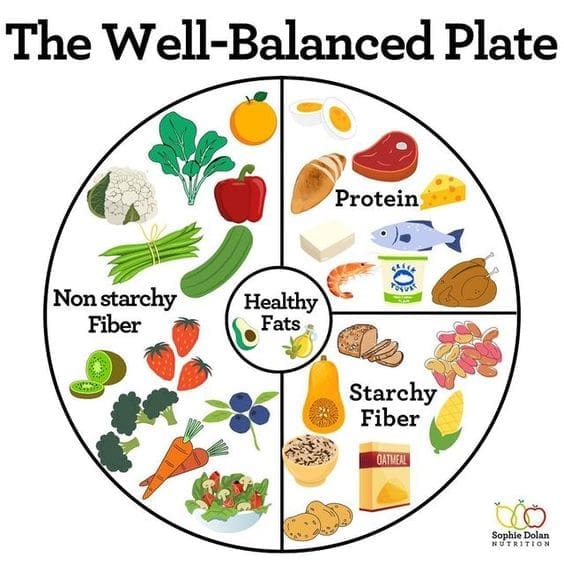When it comes to maintaining a healthy diet, eating high-protein foods is important. Simply because, protein serves as the fundamental building blocks for our muscles, bones, and skin, playing a pivotal role in various bodily functions.
Consuming protein-rich foods not only aids in muscle growth and maintenance but also facilitates weight management and overall well-being.

In this comprehensive guide, we will explore the numerous benefits of eating foods with lots of protein, highlight the best sources of protein from both animal and plant-based sources, and give you some easy tips for adding more protein to your meals.
Understanding the Importance of Protein
Protein is a macronutrient composed of amino acids, essential for various bodily functions:
- Muscle Development and Repair: Proteins are fundamental in repairing and building muscle tissues, making them indispensable for athletes and active individuals.
- Bone Health: Alongside calcium and vitamin D, proteins contribute to bone strength and density, crucial for preventing osteoporosis and other bone-related issues.
- Satiety and Weight Management: High-protein foods promote a feeling of fullness, reducing the urge to overeat and aiding in weight control.
- Enzyme and Hormone Production: Proteins are vital in producing enzymes and hormones that regulate metabolism, digestion, and other physiological processes.
Top Sources of Protein
Protein can be sourced from both animal and plant-based foods, each offering unique nutritional benefits:
- Animal-Based Protein Sources:
- Chicken Breast: Lean and rich in essential amino acids, ideal for muscle repair and growth.
- Eggs: Versatile and packed with nutrients, including vitamins A, D, E, and B-complex vitamins.
- Cottage Cheese: High in casein protein, supports prolonged muscle protein synthesis and repair.
- Fish (e.g., Salmon): Rich in omega-3 fatty acids, promotes heart health and reduces inflammation.
- Milk: Contains whey and casein proteins, essential for bone health due to its calcium and vitamin D content.
- Plant-Based Protein Sources:
- Quinoa: A complete protein containing all essential amino acids, gluten-free, and high in fiber.
- Chickpeas: Versatile legume rich in protein, fiber, and various vitamins and minerals.
- Tofu: Made from soybeans, a staple in vegan and vegetarian diets, rich in iron and calcium.
- Lentils: High in protein and fiber, supports digestive health and helps regulate blood sugar levels.
- Nuts and Seeds: Almonds, chia seeds, and peanuts are rich in protein, healthy fats, and essential minerals.
| Food | Protein Content (per 100g) | Health Benefits |
| Chicken Breast | 31g | Low in fat, high in essential amino acids |
| Eggs | 13g | Rich in vitamins and minerals, versatile in cooking |
| Cottage Cheese | 11g | High in casein protein, supports muscle repair |
| Almonds | 21g | High in healthy fats, fiber, and magnesium |
| Milk | 3.4g | Rich in calcium and vitamin D, supports bone health |
| Lentils | 9g | High in fiber, supports digestive health |
| Fish (e.g., Salmon) | 20g | Rich in omega-3 fatty acids, supports heart health |
| Peanut Butter | 25g | High in healthy fats and fiber, energy-dense |
Benefits of High-Protein Foods
- Enhanced Muscle Mass and Strength: Regular consumption of protein supports muscle development and repair, aiding in recovery after physical activity.
- Improved Metabolic Function: Proteins boost metabolism, helping to burn more calories and maintain a healthy weight.
- Stabilized Blood Sugar Levels: Protein-rich meals prevent spikes in blood sugar, reducing the risk of diabetes and promoting sustained energy levels.
- Supports Immune Function: Amino acids from proteins are crucial for immune system function, aiding in the production of antibodies and immune cells.
Practical Tips for Including Protein in Your Diet

- Balanced Meals: Ensure each meal includes a source of protein, along with carbohydrates and healthy fats, for a well-rounded nutritional profile.
- Healthy Snacking: Opt for protein-rich snacks like Greek yogurt, mixed nuts, or hummus with vegetables to curb hunger between meals.
- Meal Planning: Plan meals ahead to incorporate diverse protein sources, ensuring nutritional variety and balanced intake.
- Cooking Tips: Experiment with new recipes that feature high-protein ingredients, such as grilled chicken salads, tofu stir-fries, or lentil soups.
Expert Insights and Recommendations
- Nutritional Diversity: Consuming a variety of protein sources ensures a broader spectrum of essential nutrients and promotes overall health.
- Hydration: Adequate water intake is crucial when consuming protein-rich foods to support digestion and nutrient absorption.
- Personalization: Tailor your protein intake to your individual needs, considering factors like age, activity level, and dietary preferences.
Finally
Making sure to eat foods that are rich in protein every day is really important for staying healthy. It doesn’t matter if you like to eat meat or prefer plant-based foods, there is an abundance of delicious and nutritious choices available.
Understanding why protein is good for you and making smart choices about what you eat can contribute to an improved sense of well-being and overall health.


